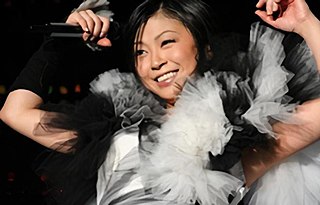
Hikaru Utada, also known mononymously as Utada, is a Japanese and American singer, songwriter, and producer. She is considered to be one of the most influential and best-selling musical artists in Japan.

Deep River is the fourth studio album by Japanese-American singer Hikaru Utada. It was released via Toshiba EMI on June 19, 2002. The title of the album, as well as its title track, was inspired by the novel Deep River by Shusaku Endo. Utada wrote and co-produced the majority of the record, and unlike her previous album Distance (2001), she worked primarily with Japanese collaborator Akira Miyake and her father Teruzane Utada. Musically, Deep River is widely noted by fans and critics as the transition state from Utada's earlier style, R&B, to ethereal pop.

"Hikari" is a song recorded by Japanese–American recording artist Hikaru Utada for her fourth studio and third Japanese language album, Deep River (2002). It premiered on March 20, 2002, as the third single from the album in Japan. It was written and composed by Utada, whilst production and arrangement was handled by Utada, her father Teruzane Utada, and long-time collaborator Miyake Akira. The single, and a remix by Russell McNamara, was used as the official Japanese theme song for the 2002 action role-playing video game Kingdom Hearts, and appeared on its original soundtrack respectively. Musically, "Hikari" is a pop folk song. Lyrically, it is about mysteries in life and human activities.

"First Love" is a song by the Japanese-American singer-songwriter Hikaru Utada. It was released on April 28, 1999, as the third Japanese language single from her second studio album, First Love, which was issued a month previously. It was certified double platinum for 800,000 copies shipped to stores in Japan.

Ultra Blue is the sixth album by Japanese–American singer Hikaru Utada, released on June 14, 2006, by Eastworld. It is the first original Japanese language album under Hikaru Utada's name in four years since her third album Deep River (2002). Ultra Blue contains thirteen songs, including six singles released between 2003 and 2006. While the arrangements for her album Deep River were done collaboratively, all but one of the songs on Ultra Blue were written, composed, and arranged solely by Utada, who also did the programming herself. In this album, the R&B elements that have been present since her debut are further diminished, and the majority of the songs have an electronic flavor with an emphasis on synth sounds.
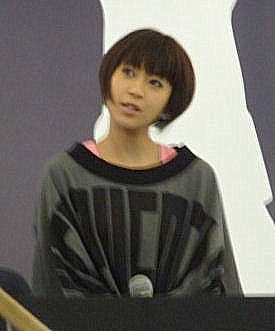
The discography of Japanese-American R&B and pop singer Hikaru Utada consists of eleven studio albums, four compilation albums, eleven video albums and numerous singles and promotional singles. Utada began as a musician in the early 1990s as a member of U3, a family unit made up of her, her mother Junko Utada, also known as 1970s enka singer Keiko Fuji, and her father, musical producer Teruzane Utada. U3 released their debut album Star in 1993, with the hope to debut in America. In 1996, the group was rebranded as Cubic U, an R&B project focusing on Hikaru Utada, resulting in the English language album Precious in 1998 with record label Toshiba EMI.

"Beautiful World" is a song by Japanese American musician Hikaru Utada. It served as the theme song for Evangelion: 1.0 You Are (Not) Alone, the 2007 film reboot of the anime Neon Genesis Evangelion. It was released as a double A-side single on August 29, 2007 along with her song "Kiss & Cry", which had been released digitally three months earlier. The song was written and co-produced by Utada, while Akira Miyake and the singer's father Teruzane Utada served as producers. In 2009, a remix of the song, "Beautiful World " served as the theme song of the second film in the series, Evangelion: 2.0 You Can (Not) Advance.
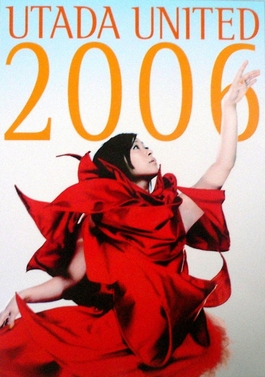
Utada United 2006 was a Japanese concert tour by Japanese-American singer-songwriter Hikaru Utada. It was Utada's second concert tour of Japan following her Bohemian Summer 2000 tour. A live DVD of the tour was released on December 20, 2006.
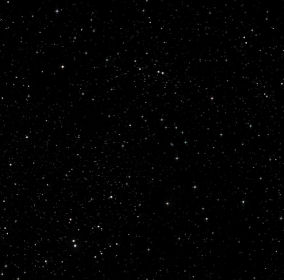
Utada Hikaru Single Collection Vol. 2 is Japanese pop singer-songwriter Hikaru Utada's second compilation album, released on November 24, 2010, by EMI Music Japan, the same day as her Universal-released English language compilation album, Utada the Best. The album includes two discs, with the first being a 13-track greatest hits album spanning 2004–2009, while the second is an extended play featuring new material. Along with Utada the Best, this remained Utada's last album release for six years, until 2016's Fantôme, due to an announced hiatus. Several of the new songs achieved commercial success, with "Goodbye Happiness" reaching number one on Billboard's Japan Hot 100 chart, and "Can't Wait 'Til Christmas" reaching number one on the Recording Industry Association of Japan's digital track chart. Both songs have been certified by the association as gold records for full-length cellphone downloads.

Wild Life was Japanese-American singer-songwriter Hikaru Utada's final concert tour before her scheduled hiatus from 2011. Utada performed only two dates at the Yokohama Arena, Japan on December 8 and 9, 2010.

"Sakura Nagashi" is a song by Japanese singer-songwriter Hikaru Utada. It was released by EMI Music Japan digitally on November 17, 2012, with a DVD single released December 26, 2012. The song is the theme to the third film of the Rebuild of Evangelion movie series, Evangelion: 3.0 You Can (Not) Redo, and was later included on their sixth Japanese-language studio album Fantôme, released in 2016. The single also marked Utada's last release under the then EMI-controlled EMI Music Japan as the label was absorbed into Universal Music Japan as EMI Records Japan in April 2013.

"Letters" is a song by Japanese American musician Hikaru Utada. It was released as a double A-side single with the song "Sakura Drops" on May 9, 2002.

"Sakura Drops" is a song by Japanese-American musician Hikaru Utada. It was released as a double A-side single with the song "Letters" on May 9, 2002.
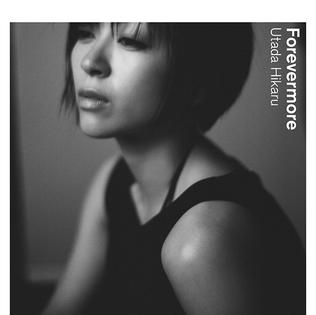
"Forevermore" is a song by Japanese American singer-songwriter Hikaru Utada. It is their second single under the label Epic Records, from their upcoming seventh Japanese-language studio album, Hatsukoi. The song was used as a tie-in for TBS dorama Gomen, Aishiteru, their first single used in a drama of a commercial TV station since "Eternally " in 2008. It features the renowned drummer Chris Dave.
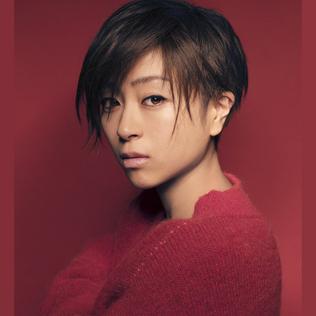
"Anata" is a song by Japanese-American singer-songwriter Hikaru Utada. It is their third single under the label Epic Records Japan, from their seventh Japanese-language studio album Hatsukoi. The song was used as a tie-in for movie Destiny: The Tale of Kamakura, and was released as a digital download on December 8. The song is their first movie tie-in in 5 years, since "Sakura Nagashi" was released in 2012 for Evangelion: 3.0 You Can (Not) Redo. The song was written with a Buddhist's view to show both the real and fantasy mixed world shown in the movie. Besides the movie, the song is also featured in a Sony campaign to promote a wireless headphone line, in which they themself also appears.
"Chikai" is a song by Japanese American singer-songwriter Hikaru Utada. Along with its English-language counterpart "Don't Think Twice", it serves as the ending theme song to the Square Enix video game, Kingdom Hearts III. "Chikai" first appeared on Utada's seventh Japanese-language studio album, Hatsukoi, and was also included on the setlist of their Laughter In The Dark Tour.

"Hatsukoi" is a song by Japanese-American singer-songwriter Hikaru Utada. It is her fifth single under the label Epic Records Japan and was taken from her seventh Japanese-language studio album Hatsukoi. The song was released as a digital download on May 30 and was used as a tie-in for the Japanese television drama Hana Nochi Hare - Hanadan Next Season. It's the second song that Utada delivers to the series, after Flavor of Life in 2007.
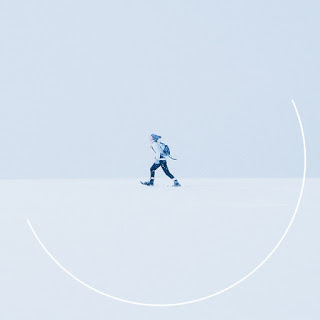
"Play a Love Song" is a song by Japanese-American singer-songwriter Hikaru Utada. It is her fourth single under the label Epic Records Japan, from her seventh Japanese-language studio album Hatsukoi. The song was released as a digital download on April 25, 2018 and was being used as a tie-in for Tennensui Suntory Water.

Hatsukoi is the seventh Japanese-language studio album by Japanese–American recording artist Hikaru Utada. It was released on June 27, 2018, as her first album under Sony Music Japan sublabel Epic Records Japan. The release coincided with the commemoration of her 20th Anniversary as an artist in Japan. A national tour was announced to support the album in November 2018. The five previously released songs were confirmed in the album track list, for a total of twelve songs, including the title track "Hatsukoi" and the Kingdom Hearts III theme song "Chikai".

"Face My Fears" is a song by Japanese-American singer Hikaru Utada and American DJ Skrillex. It was released on various formats by Epic and Sony Music Japan on January 18, 2019, and serves as the lead single from Utada's eleventh studio album, Bad Mode (2022). It was recorded in both English and Japanese and serves as the theme song for Square Enix's 2019 action role-playing game Kingdom Hearts III. After being approached by Square Enix to work on the video game, Utada asked Skrillex to remix "Don't Think Twice" for the game, but later decided to collaborate and create a new song as well.

















